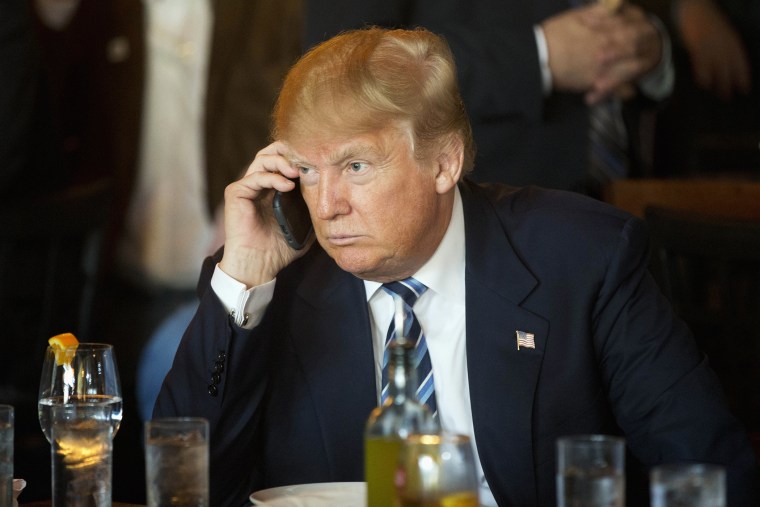Shortly after his election victory, Donald Trump spoke on the phone with British Prime Minister Theresa May and reportedly told her, "If you travel to the U.S., you should let me know."
As regular readers may recall, the casual invitation "left civil servants amused and befuddled." In Trump's mind, the British prime minister might have plans to swing by America for a visit, in which case, the president-elect hoped May would give him a heads-up. What Trump didn't realize is that May would only come if invited. The incoming American president didn't understand how presidential diplomacy is supposed to work.
And he still doesn't. The Associated Press reported last night that Trump "has been handing out his cellphone number to world leaders and urging them to call him directly, an unusual invitation that breaks diplomatic protocol and is raising concerns about the security and secrecy of the U.S. commander in chief's communications."
At face value, it may seem as if the president is simply being collegial with foreign officials. It might even seem like a positive: Trump may alienate many world leaders, but here's evidence of him trying to be friendly, giving allies such as Theresa May, Canadian Prime Minister Justin Trudeau, and French President Emmanuel Macron direct access.
But as the Associated Press report explained, the American president apparently doesn't appreciate the details.
The notion of world leaders calling each other up via cellphone may seem unremarkable in the modern, mobile world. But in the diplomatic arena, where leader-to-leader calls are highly orchestrated affairs, it is another notable breach of protocol for a president who has expressed distrust of official channels. The formalities and discipline of diplomacy have been a rough fit for Trump — who, before taking office, was long easily accessible by cellphone and viewed himself as freewheeling, impulsive dealmaker.Presidents generally place calls on one of several secure phone lines, including those in the White House Situation Room, the Oval Office or the presidential limousine. Even if Trump uses his government-issued cellphone, his calls are vulnerable to eavesdropping, particularly from foreign governments, national security experts say.
In case this isn't obvious, Trump spent a year condemning Hillary Clinton for using a private email server to conduct official business -- which makes it odd that he now wants to use a private phone to conduct official business.
Ashley Deeks, a law professor at the University of Virginia who formerly served as the assistant legal adviser for political-military affairs in the U.S. State Department, told the Associated Press, "Government sometimes looks like a big bureaucracy that has stupid rules, but a lot of these things are in place for very good reasons and they've been around for a while and determine the most effective way to do business in the foreign policy sphere. Sometimes it takes presidents longer to figure that out."
